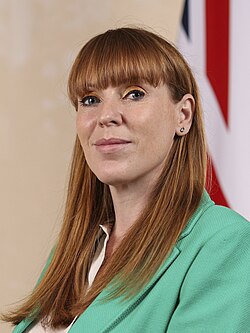Angela Rayner: Key Player in UK Politics

Introduction
Angela Rayner has emerged as a significant figure in UK politics, particularly as the current Deputy Leader of the Labour Party and Member of Parliament for Ashton-under-Lyne. Her influence in shaping Labour’s policies, especially around education and social justice, highlights the importance of her role within the party and the political landscape at large.
Background and Political Ascendancy
Born on March 28, 1980, in Stockport, Angela Rayner’s early life was marked by challenges, including growing up in a working-class family and becoming a single mother at a young age. She began her career as a care worker and later, upon joining Labour’s Shadow Cabinet in 2016, quickly rose through the ranks of the party. Over the years, she has held various significant roles, including Shadow Secretary of State for Education, where she has been vocal about reforms needed in the education sector, especially to support children from disadvantaged backgrounds.
Recent Developments
As of late 2023, Angela Rayner continues to be a prominent voice in the opposition against the Conservative government, particularly regarding key issues like the cost of living crisis, climate change, and social equity. In a recent address, she outlined Labour’s strategy to tackle economic disparities and boost support for working families. Furthermore, her candid discussions about mental health and education reform resonate with many constituents, establishing her as a relatable and approachable leader.
Impact on Labour Party
Angela Rayner’s leadership style is often regarded as a mix of resilience and empathy, which has endeared her to both party members and the public. Her ability to connect with everyday issues reflects Labour’s ongoing commitment to addressing the needs of the community. The composition of the party’s current strategy shows a shift towards inclusivity, with Rayner being a crucial proponent of this approach. Her advocacy for gender equality and workers’ rights continues to shape Labour’s policies and electoral strategy.
Conclusion
As Angela Rayner continues her tenure as Deputy Leader of the Labour Party, her role remains critical in steering the party towards a more equitable future. Her initiatives focused on education, social justice, and economic reform resonate as essential pillars in Labour’s platform ahead of upcoming elections. Observers expect her influence to grow as the party navigates a challenging political environment and responds to the pressing needs of the British public. Consequently, Angela Rayner’s actions in the coming months will likely have significant implications for Labour’s prospects and the future of UK politics.









